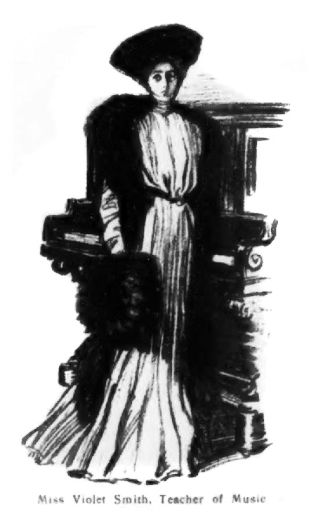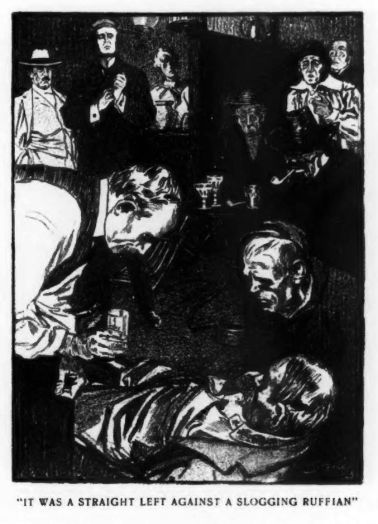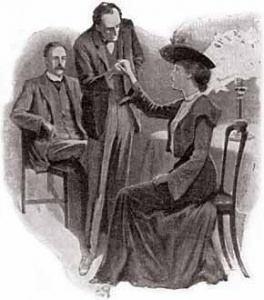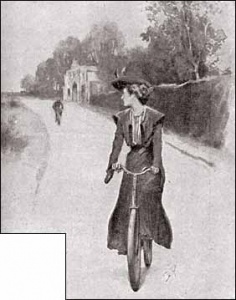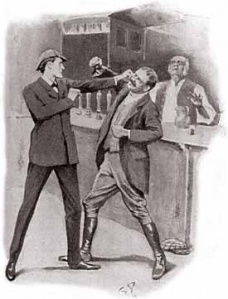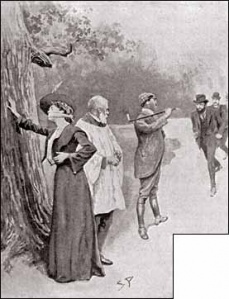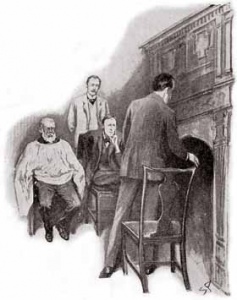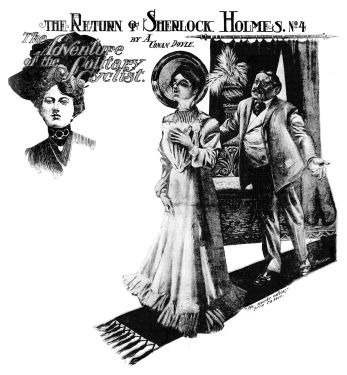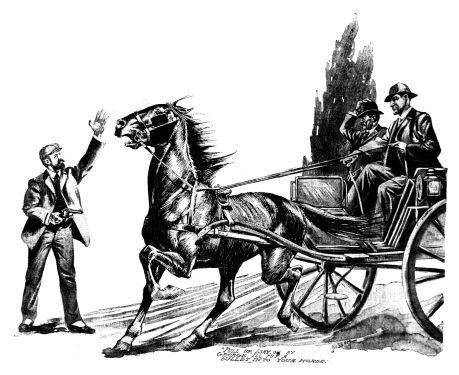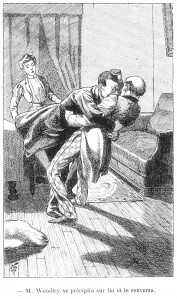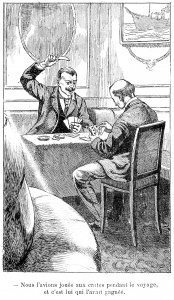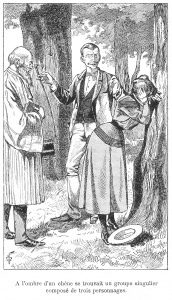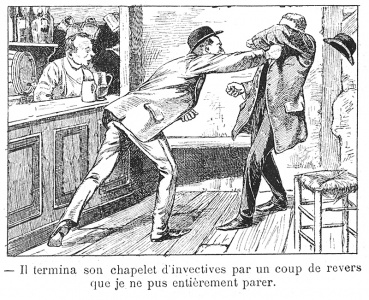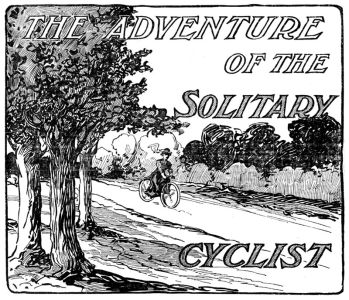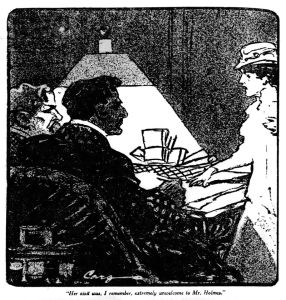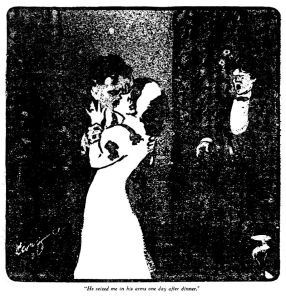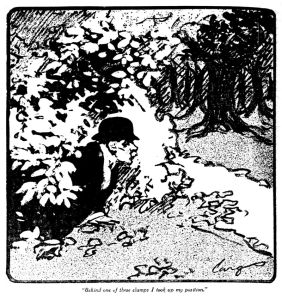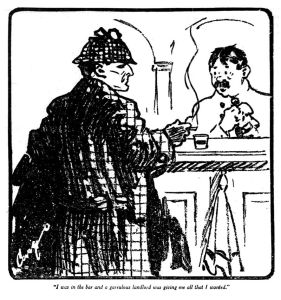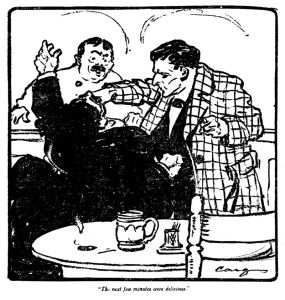The Adventure of the Solitary Cyclist
| << The Adventure of the Dancing Men #30 | #32 The Adventure of the Priory School >> |
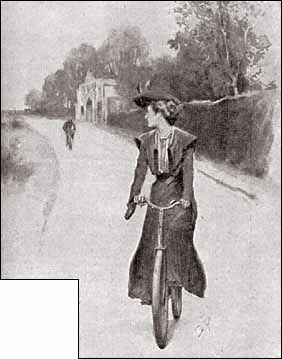
The Adventure of the Solitary Cyclist (SOLI) is a short story written by Arthur Conan Doyle first published in the Collier's magazine, 26 december 1903 (US) and in The Strand Magazine in january 1904 (UK). This is the 31st Sherlock Holmes story. Collected in The Return of Sherlock Holmes.
Editions
- in Collier's (26 december 1903 [US]) 4 illustrations by Frederic Dorr Steele
- in The Strand Magazine (january 1904 [UK]) 7 ill. by Sidney Paget
- in The Return of Sherlock Holmes (1905-1930)
- in The Los Angeles Times (5 march 1905 [US]) 2 ill. by Frederic Dorr Steele
- in The San Francisco Call (26 march 1905 [US]) 3 ill. by Reginald G. Russom
- in Nouveaux exploits de Sherlock Holmes (may 1905, Félix Juven [FR]) as La Cycliste solitaire
- in Owensboro Inquirer (1-5 june 1905 [US]) 4 ill. by Frederic Dorr Steele
- in Als Sherlock Holmes aus Lhassa kam sieben Neue Detektivgeschichten (1905, Robert Lutz Sherlock Holmes series No. 7 [DE]) as Die einsame Radfahrerin
- in La Cycliste solitaire (1905-1906, Société d'Édition et de Publications Collection Rouge No. 3 [FR]) as La Cycliste solitaire, 5 ill. by Martin Van Maële
- in The World, New York, Fiction Magazine (30 april 1911 [US]) ill. by Dan Smith
- in The Chicago Tribune (9 july 1911 [US]) 6 ill. by Cargs
- in Als Sherlock Holmes aus Lhassa kam sieben Neue Detektivgeschichten (1920s, Robert Lutz Sherlock Holmes series No. 7 [DE]) as Die einsame Radfahrerin
- in The Empty House (1921, George Newnes Ltd. Sevenpenny Novels No. 33 [UK])
- in Stoll's Editorial News (30 june, 28 july, 11 august & 8 september 1921 [UK]) 3 photos
- in Greensboro Daily News (7 august 1921 [US]) no ill.
Illustrations
- Illustrations by Frederic Dorr Steele in Collier's (26 december 1903)
-
The Return of Sherlock Holmes. The Adventure of the Solitary Cyclist.
-
Magazine cover.
-
Miss Violet Smith, Teacher of Music.
-
"It was a straight left against a slogging ruffian."
- Illustrations by Sidney Paget in The Strand Magazine (january 1904)
-
My friend took the Lady's ungloved hand.
-
I slowed down my machine.
-
It was a straight left against a slogging ruffian.
-
'Too late, Watson; too late!' cried Holmes.
-
As we approached, the Lady staggered against the trunk of the tree for support.
-
He spun round with a scream and fell upon his back.
-
Holmes rose and tossed the end of his cigarette into the grate.
- Illustrations by Reginald G. Russom in The San Francisco Call (26 march 1905)
-
"He made odious love to me."
-
"Pull up, I say, or by George, I'll put a bullet into your horse."
- Illustrations by Martin Van Maële (Société d'Édition et de Publications, 1905-1906)
-
Mr Woodley turned upon his own host, knocking him down.
-
'We played cards for her on the voyage. He won.'
-
Under the shadow of a mighty oak, there stood a singular group of three people.
-
He ended a string of abuse by a vicious back-hander, which I failed to entirely avoid.
-
She suddenly whisked her wheels round and dashed straight at him!
- Illustrations by Dan Smith (The World, New York, 1911)
-
cover
- Illustrations by Cargs in The Chicago Tribune (9 july 1911)
-
The Adventure of the Solitary Cyclist
-
"Her visit was, I remember, extremely unwelcome to Mr. Holmes."
-
"He seized me in this arms one day after dinner."
-
"Behind one of these clumps I took up my position."
-
"I was in the bar and a garrulous landlord was giving me all that I wanted."
-
"The next few minutes were delicious."
Characters
- Sherlock Holmes aka Mr. Busybody Holmes
- John H. Watson
- Violet Smith aka Mrs. Woodley
- John Vincent Harden
- Archie Stamford
- James Smith
- Ralph Smith
- Bob Carruthers
- Jack Woodley
- Cyril Morton
- Mrs Dixon
- Tudor
- Mr. Williamson
- George
- Peter
- Jingo
Locations
- Baker Street
- Imperial Theatre
- Chiltern Grange
- Charlington Hall
- Charlington Heath
- Charlington Wood
- Crooksbury Hill
- The Midland Electric Company, Coventry
- The City
- Waterloo Station
- Farnham Station
- Pall Mall
- Scotland Yard
- Morton and Kennedy, Westminster
Towns
- London
- Farnham
- Johannesburg
- Coventry
- Kimberley
Regions
- Charlington
- Surrey
- Africa
- Midlands
- Westminster
Countries
- South Africa
Untold Stories
Chronology
- Saturday 23 april 1895 (John H. Watson)
- 23 march 1895 (Jay Finley Christ)
- 13 april 1895 (William Stuart Baring-Gould)
- More chronologists
Filmography
- 1921 : The Solitary Cyclist (UK). Holmes : Eille Norwood. Watson : Hubert Willis.
- 1968 : The Solitary Cyclist (US). Holmes : Peter Cushing. Watson : Nigel Stock.
- 1984 : The Solitary Cyclist (UK). Holmes : Jeremy Brett. Watson : David Burke.
- 1989 : La Cycliste solitaire (FR). Holmes : Jean Clément. Watson : Philippe Nahon.
Radiography
- 1931 : The Solitary Cyclist. Holmes : Richard Gordon. Watson : Leigh Lovell.
- 1936 : The Adventure of the Solitary Cyclist. Holmes : Louis Hector. Watson : Harry West.
- 1941 : The Solitary Cyclist. Holmes : Basil Rathbone. Watson : Nigel Bruce.
- 1954 : The Adventure of the Solitary Cyclist. Holmes : John Gielgud. Watson : Ralph Richardson.
- 1955 : The Adventure of the Solitary Cyclist. Holmes : John Gielgud. Watson : Ralph Richardson.
- 1964 : The Solitary Cyclist. Holmes : Carleton Hobbs. Watson : Norman Shelley.
- 1967 : The Solitary Cyclist. Holmes : Carleton Hobbs. Watson : Norman Shelley.
- 1978 : The Solitary Cyclist. Holmes : Barry Foster. Watson : David Buck.
- 1993 : The Solitary Cyclist. Holmes : Clive Merrison. Watson : Michael Williams.
Plot summary (spoiler)
In april 1895, Holmes is contacted by a beautiful young music teacher named Violet Smith who lives near Farnham in Surrey. She's worried about a stranger who stalks her when she bicycles to and from the train station when she goes to see her fiancé in London each weekend. This man appears and disappears mysteriously. Violet Smith and her mother were living in poverty until few months ago, when two friends of her uncle Ralph Smith from South Africa, came to announce that he asked them to take care of his closest relatives. One the two men, Carruthers, is affable. He offers Violet an excellent wage to live in his house and teach music to his daughter, and he seems to grow fond of the young woman. The other one, Woodley, is rough and makes unwanted advances. Watson, asked by Holmes to visit Farnham and collect information, figures out that the stalking cyclist disappears by hiding in a hedge along the property of Mr. Williamson, a defrocked clergyman, whose residence is known as a place of debauchery, regularly visited by Woodley. The next day, Holmes gets a letter from Violet Smith informing him that she's about to leave Carruthers's home to live permanently in London. She feels too uncomfortable since she had to turn down Carruthers's proposal, and since Woodley, who had been thrown out, has returned as rude as ever. Holmes and Watson, worried, rush to Farnham, where they catch the mysterious cyclist, who turns out to be Carruthers, who is trying to protect Violet. The three men unfortunately arrive too late to stop Violet's abduction. When they find her, she's been forcibly married to Woodley by Williamson. Holmes, who has no doubt this marriage can be annulled, explains that Carruthers and Woodley came back from South Africa to try to get Violet to marry one of them, as her uncle was about to die and she was going to inherit a fortune from him. The two men would then share the money. But Carruthers's blossoming love for Violet estranged the two accomplices and Woodley resorted to criminal action with the help of Williamson.
Text
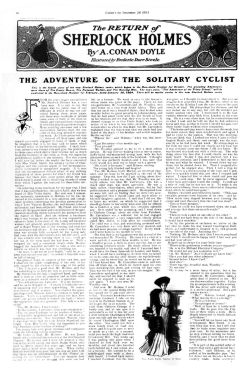



From the years 1894 to 1901 inclusive, Mr Sherlock Holmes was a very busy man. It is safe to say that there was no public case of any difficulty in which he was not consulted during those eight years, and there were hundreds of private cases, some of them of the most intricate and extraordinary character, in which he played a prominent part. Many startling successes and a few unavoidable failures were the outcome of this long period of continuous work. As I have preserved very full notes of all these cases, and was myself personally engaged in many of them, it may be imagined that it is no easy task to know which I should select to lay before the public. I shall, however, preserve my former rule, and give the preference to those cases which derive their interest not so much from the brutality of the crime as from the ingenuity and dramatic quality of the solution. For this reason I will now lay before the reader the facts connected with Miss Violet Smith, the solitary cyclist of Charlington, and the curious sequel of our investigation, which culminated in unexpected tragedy. It is true that the circumstances did not permit of any striking illustration of those powers for which my friend was famous, but there were some points about the case which made it stand out in those long records of crime from which I gather the material for these little narratives.
On referring to my note-book for the year 1895, I find that it was upon Saturday, April 23rd, that we first heard of Miss Violet Smith. Her visit was, I remember, extremely unwelcome to Holmes, for he was immersed at the moment in a very abstruse and complicated problem concerning the peculiar persecution to which John Vincent Harden the well-known tobacco millionaire, had been subjected. My friend, who loved above all things precision and concentration of thought, resented anything which distracted his attention from the matter in hand. And yet without a harshness which was foreign to his nature it was impossible to refuse to listen to the story of the young and beautiful woman, tall, graceful and queenly, who presented herself at Baker Street late in the evening and implored his assistance and advice. It was vain to urge that his time was already fully occupied, for the young lady had come with the determination to tell her story, and it was evident that nothing short of force could get her out of the room until she had done so. With a resigned air and a somewhat weary smile, Holmes begged the beautiful intruder to take a seat and to inform us what it was that was troubling her.
'At least it cannot be your health,' said he, as his keen eyes darted over her; 'so ardent a bicyclist must be full of energy.'
She glanced down in surprise at her own feet, and I observed the slight roughening of the side of the sole caused by the friction of the edge of the pedal.
'Yes, I bicycle a good deal, Mr Holmes, and that has something to do with my visit to you to-day.'
My friend took the lady's ungloved hand and examined it with as close an attention and as little sentiment as a scientist would show to a specimen.
'You will excuse me, I am sure. It is my business,' said he, as he dropped it. 'I nearly fell into the error of supposing that you were typewriting. Of course, it is obvious that it is music. You observe the spatulate finger end, Watson, which is common to both professions? There is a spirituality about the face, however' - he gently turned it towards the light - 'which the typewriter does not generate. This lady is a musician.'
'Yes, Mr Holmes, I teach music.'
'In the country, I presume, from your complexion.'
'Yes, sir; near Farnham, on the borders of Surrey.'
'A beautiful neighbourhood, and full of the most interesting associations. You remember, Watson, that it was near there that we took Archie Stamford, the forger. Now, Miss Violet, what has happened to you near Farnham, on the borders of Surrey?'
The young lady, with great clearness and composure, made the following curious statement:
'My father is dead, Mr Holmes. He was James Smith, who conducted the orchestra at the old Imperial Theatre. My mother and I were left without a relation in the world except one uncle, Ralph Smith, who went to Africa twenty-five years ago, and we have never had a word from him since. When Father died we were left very poor, but one day we were told that there was an advertisement in The Times inquiring for our whereabouts. You can imagine how excited we were, for we thought that someone had left us a fortune. We went at once to the lawyer whose name was given in the paper. There we met two gentlemen, Mr Carruthers and Mr Woodley, who were home on a visit from South Africa. They said that my uncle was a friend of theirs, that he died some months before in great poverty in Johannesburg, and that he had asked them with his last breath to hunt up his relations and see that they were in no want. It seemed strange to us that Uncle Ralph, who took no notice of us when he was alive, should be so careful to look after us when he was dead; but Mr Carruthers explained that the reason was that my uncle had just heard of the death of his brother, and so felt responsible for our fate.'
'Excuse me,' said Holmes; 'when was this interview?'
'Last December - four months ago.'
'Pray proceed.'
'Mr Woodley seemed to me to be a most odious person. He was for ever making eyes at me - a coarse, puffy-faced, red-moustached young man, with his hair plastered down on each side of his forehead. I thought that he was perfectly hateful - and I was sure that Cyril would not wish me to know such a person.'
'Oh, Cyril is his name!' said Holmes, smiling.
The young lady blushed and laughed.
'Yes, Mr Holmes; Cyril Morton, an electrical engineer, and we hope to be married at the end of the summer. Dear me, how did I get talking about him? What I wished to say was that Mr Woodley was perfectly odious, but that Mr Carruthers, who was a much older man, was more agreeable. He was a dark, sallow, clean-shaven, silent person; but he had polite manners and a pleasant smile. He inquired how we were left, and on finding that we were very poor he suggested that I should come and teach music to his only daughter, aged ten. I said that I did not like to leave my mother, on which he suggested that I should go home to her every week-end, and he offered me a hundred a year, which was certainly splendid pay. So it ended by my accepting, and I went down to Chiltern Grange, about six miles from Farnham. Mr Carruthers was a widower, but he had engaged a lady-housekeeper, a very respectable, elderly person, called Mrs Dixon, to look after his establishment. The child was a dear, and everything promised well. Mr Carruthers was very kind and very musical, and we had most pleasant evenings together. Every week-end I went home to my mother in town.
'The first flaw in my happiness was the arrival of the red-moustached Mr Woodley. He came for a visit of a week, and oh, it seemed three months to me! He was a dreadful person, a bully to everyone else, but to me something infinitely worse. He made odious love to me, boasted of his wealth, said that if I married him I would have the finest diamonds in London, and finally, when I would have nothing to do with him, he seized me in his arms one day after dinner — he was hideously strong and he swore that he would not let me go until I had kissed him. Mr Carruthers came in, and tore him off from me, on which he turned upon his own host, knocking him down and cutting his face open. That was the end of his visit, as you can imagine. Mr Carruthers apologized to me next day, and assured me that I should never be exposed to such an insult again. I have not seen Mr Woodley since.
'And now, Mr Holmes, I come at last to the special thing which has caused me to ask your advice to-day. You must know that every Saturday forenoon I ride on my bicycle to Farnham Station in order to get the 12.22 to town. The road from Chiltern Grange is a lonely one, and at one spot it is particularly so, for it lies for over a mile between Charlington Heath upon one side and the woods which lie round Charlington Hall upon the other. You could not find a more lonely tract of road anywhere, and it is quite rare to meet so much as a cart, or a peasant, until you reach the high-road near Crooksbury Hill. Two weeks ago I was passing this place when I chanced to look back over my shoulder, and about two hundred yards behind me I saw a man, also on a bicycle. He seemed to be a middle-aged man, with a short, dark beard. I looked back before I reached Farnham, but the man was gone, so I thought no more about it. But you can imagine how surprised I was, Mr Holmes, when on my return on the Monday I saw the same man on the same stretch of road. My astonishment was increased when the incident occurred again, exactly as before, on the following Saturday and Monday. He always kept his distance, and did not molest me in any way, but still it certainly was very odd. I mentioned it to Mr Carruthers, who seemed interested in what I said, and told me that he had ordered a horse and trap, so that in future I should not pass over these lonely roads without some companion.
The horse and trap were to have come this week, but for some reason they were not delivered, and again I had to cycle to the station. That was this morning. You can think that I looked out when I came to Charlington Heath, and there, sure enough, was the man, exactly as he had been the two weeks before. He always kept so far from me that I could not clearly see his face, but it was certainly someone whom I did not know. He was dressed in a dark suit with a cloth cap. The only thing about his face that I could clearly see was his dark beard. To-day I was not alarmed, but I was filled with curiosity, and I determined to find out who he was and what he wanted. I slowed down my machine, but he slowed down his. Then I stopped altogether, but he stopped also. Then I laid a trap for him. There is a sharp turning of the road, and I pedalled very quickly round this, and then I stopped and waited. I expected him to shoot round and pass me before he could stop. But he never appeared. Then I went back and looked round the corner. I could see a mile of road, but he was not on it. To make it the more extraordinary there was no side-road at this point down which he could have gone.'
Holmes chuckled and rubbed his hands.
'This case certainly presents some features of its own,' said he. 'How much time elapsed between your turning the corner and your discovery that the road was clear?'
'Two or three minutes.'
'Then he could not have retreated down the road, and you say that there are no side-roads?'
'None.'
'Then he certainly took a footpath on one side or the other.'
'It could not have been on the side of the heath or I should have seen him.'
'So by the process of exclusion we arrive at the fact that he made his way towards Charlington Hall, which, as I understand, is situated in its own grounds on one side of the road. Anything else?'
'Nothing, Mr Holmes, save that I was so perplexed that I felt I should not be happy until I had seen you and had your advice.'
Holmes sat in silence for some little time.
'Where is the gentleman to whom you are engaged?' he asked at last.
'He is in the Midland Electric Company, at Coventry? 'He would not pay you a surprise visit?'
'Oh, Mr Holmes! As if I should not know him!'
'Have you had any other admirers?'
'Several before I knew Cyril.'
'And since?'
'There was this dreadful man, Woodley, if you can call him an admirer.'
'No one else?'
Our fair client seemed a little confused.
'Who was he?' asked Holmes.
'Oh, it may be a mere fancy of mine; but it has seemed to me sometimes that my employer, Mr Carruthers, takes a great deal of interest in me. We are thrown rather together. I play his accompaniments in the evening. He has never said anything. He is a perfect gentleman. But a girl always knows.'
'Ha!' Holmes looked grave. 'What does he do for a living?'
'He is a rich man.'
'No carriages or horses?'
'Well, at least he is fairly well-to-do. But he goes into the City two or three times a week. He is deeply interested in South African gold shares.'
'You will let me know any fresh development, Miss Smith. I am very busy just now, but I will find time to make some inquiries into your case. In the meantime, take no step without letting me know. Good-bye, and I trust that we shall have nothing but good news from you.'
'It is part of the settled order of Nature that such a girl should have followers,' said Holmes, as he pulled at his meditative pipe, 'but for choice not on bicycles in lonely country roads. Some secretive lover, beyond all doubt. But there are curious and suggestive details about the case, Watson.'
'That he should appear only at that point?'
'Exactly. Our first effort must be to find who are the tenants of Charlington Hall. Then, again, how about the connection between Carruthers and Woodley, since they appear to be men of such different types? How came they both to be so keen upon looking up Ralph Smith's relations? One more point. What sort of a ménage is it which pays double the market price for a governess, but does not keep a horse although six miles from the station? Odd, Watson - very odd.'
'You will go down?'
'No, my dear fellow, you will go down. This may be some trifling intrigue, and I cannot break my other important research for the sake of it. On Monday you will arrive early at Farnham; you will conceal yourself near Charlington Heath; you will observe these facts for yourself, and act as your own judgement advises. Then, having inquired as to the occupants of the Hall, you will come back to me and report. And now, Watson, not another word of the matter until we have a few solid stepping-stones on which we may hope to get across to our solution.'
We had ascertained from the lady that she went down upon the Monday by the train which leaves Waterloo at 9.50, so I started early and caught the 9.13. At Farnham Station I had no difficulty in being directed to Charlington Heath. It was impossible to mistake the scene of the young lady's adventure, for the road runs between the open heath on one side, and an old yew hedge upon the other, surrounding a park which is studded with magnificent trees. There was a main gateway of lichen-studded stone, each side-pillar surmounted by mouldering heraldic emblems; but besides this central carriage-drive I observed several points where there were gaps in the hedge and paths leading through them. The house was invisible from the road, but the surroundings all spoke of gloom and decay.
The heath was covered with golden patches of flowering gorse, gleaming magnificently in the light of the bright spring sunshine. Behind one of these clumps I took up my position, so as to command both the gateway of the Hall and a long stretch of the road upon either side. It had been deserted when I left it, but now I saw a cyclist riding down it from the opposite direction to that in which I had come. He was clad in a dark suit, and I saw that he had a black beard. On reaching the end of the Charlington grounds he sprang from his machine and led it through a gap in the hedge, disappearing from my view.
A quarter of an hour passed and then a second cyclist appeared. This time it was the young lady coming from the station. I saw her look about her as she came to the Charlington hedge. An instant later the man emerged from his hiding place, sprang upon his bicycle, and followed her. In all the broad landscape those were the only moving figures, the graceful girl sitting very straight upon her machine and the man behind her bending low over his handle-bar, with a curiously furtive suggestion in every movement. She looked back at him and slowed her pace. He slowed also. She stopped. He at once stopped, too, keeping two hundred yards behind her. Her next movement was as unexpected as it was spirited. She suddenly whisked her wheels round and dashed straight at him! He was as quick as she, however, and darted off in desperate flight. Presently she came back up the road again, her head haughtily in the air, not deigning to take further notice of her silent attendant. He had turned also, and still kept his distance until the curve of the road hid them from my sight.
I remained in my hiding-place, and it was well that I did so, for presently the man reappeared, cycling slowly back. He turned in at the Hall gates and dismounted from his machine. For some few minutes I could see him standing among the trees. His hands were raised, and he seemed to be settling his necktie. Then he mounted his bicycle and rode away from me down the drive towards the Hall. I ran across the heath and peered through the trees. Far away I could catch glimpses of the old grey building with its bristling Tudor chimneys, but the drive ran through a dense shrubbery, and I saw no more of my man.
However, it seemed to me that I had done a fairly good morning's work, and I walked back in high spirits to Farnham. The local house agent could tell me nothing about Charlington Hall, and referred me to a well-known firm in Pall Mall. There I halted on my way home, and met with courtesy from the representative. No, I could not have Charlington Hall for the summer. I was just too late. It had been let about a month ago. Mr Williamson was the name of the tenant. He was a respectable elderly gentleman. The polite agent was afraid he could say no more, as the affairs of his clients were not matters which he could discuss.
Mr Sherlock Holmes listened with attention to the long report which I was able to present to him that evening, but it did not elicit that word of curt praise which I had hoped for and should have valued. On the contrary, his austere face was even more severe than usual as he commented upon the things that I had done and the things that I had not.
'Your hiding-place, my dear Watson, was very faulty. You should have been behind the hedge; then you would have had a close view of this interesting person. As it is you were some hundreds of yards away, and can tell me even less than Miss Smith. She thinks she does not know the man; I am convinced she does. Why, otherwise, should he be so desperately anxious that she should not get so near him as to see his features? You describe him as bending over the handle-bar. Concealment again, you see. You really have done remarkably badly. He returns to the house, and you want to find out who he is. You come to a London house-agent!'
'What should I have done?' I cried, with some heat.
'Gone to the nearest public house. That is the centre of country gossip. They would have told you every name, from the master to the scullery-maid. Williamson! It conveys nothing to my mind. If he is an elderly man he is not this active cyclist who springs away from that athletic young lady's pursuit. What have we gained by your expedition? The knowledge that the girl's story is true. I never doubted it. That there is a connection between the cyclist and the Hall. I never doubted that either. That the Hall is tenanted by Williamson. Who's the better for that? Well, well, my dear sir, don't look so depressed. We can do little more until next Saturday, and in the meantime I may make one or two inquiries myself.'
Next morning we had a note from Miss Smith, recounting shortly and accurately the very incidents which I had seen, but the pith of the letter lay in the postscript:
I am sure that you will respect my confidence, Mr Holmes, when I tell you that my place here has become difficult owing to the fact that my employer has proposed marriage to me. I am convinced that his feelings are most deep and most honourable. At the same time my promise is, of course, given. He took my refusal very seriously, but also very gently. You can understand, however, that the situation is a little strained.
'Our young friend seems to be getting into deep waters,' said Holmes thoughtfully, as he finished the letter. 'The case certainly presents more features of interest and more possibility of development than I had originally thought. I should be none the worse for a quiet, peaceful day in the country, and I am inclined to run down this afternoon and test one or two theories which I have formed.'
Holmes's quiet day in the country had a singular termination, for he arrived at Baker Street late in the evening with a cut lip and a discoloured lump upon his forehead, besides a general air of dissipation which would have made his own person the fitting object of a Scotland Yard investigation. He was immensely tickled by his own adventures, and laughed heartily as he recounted them.
'I get so little active exercise that it is always a treat,' said he. 'You are aware that I have some proficiency in the good old British sport of boxing. Occasionally it is of service. Today, for example, I should have come to very ignominious grief without it.'
I begged him to tell me what had occurred.
'I found that country pub which I had already recommended to your notice, and there I made my discreet inquiries. I was in the bar, and a garrulous landlord was giving me all that I wanted. Williamson is a white-bearded man, and he lives alone with a small staff of servants at the Hall There is some rumour that he is or has been a clergyman; but one or two incidents of his short residence at the Hall struck me as peculiarly unecclesiastical. I have already made some inquiries at a clerical agency, and they tell me that there was a man of that name in orders whose career has been a singularly dark one. The landlord further informed me that there are usually week-end visitors - "a warm lot, sir" — at the Hall, and especially one gentleman with a red moustache, Mr Woodley by name, who was always there. We had got as far as this when who should walk in but the gentleman himself, who had been drinking his beer in the tap-room, and had heard the whole conversation. Who was I? What did I want? What did I mean by asking questions? He had a fine flow of language, and his adjectives were very vigorous. He ended a string of abuse by a vicious back-hander, which I failed to entirely avoid. The next few minutes were delicious. It was a straight left against a slogging ruffian. I emerged as you see me. Mr Woodley went home in a cart. So ended my country trip, and it must be confessed that, however enjoyable, my day on the Surrey border has not been much more profitable than your own.'
The Thursday brought us another letter from our client:
You will not be surprised, Mr Holmes [said she], to hear that I am leaving Mr Carruthers's employment. Even the high pay cannot reconcile me to the discomforts of my situation. On Saturday I come up to town, and I do not intend to return. Mr Carruthers has got a trap, and so the dangers of the lonely road, if there ever were any dangers, are now over.
As to the special cause of my leaving, it is not merely the strained situation with Mr Carruthers, but it is the reappearance of that odious man, Mr Woodley. He was always hideous, but he looks more awful than ever now, for he appears to have had an accident and he is much disfigured. I saw him out of the window, but I am glad to say I did not meet him. He had a long talk with Mr Carruthers, who seemed much excited afterwards. Woodley must be staying in the neighbourhood, for he did not sleep here, and yet I caught a glimpse of him again this morning slinking about in the shrubbery. I would sooner have a savage wild animal loose about the place. I loathe and fear him more than I can say. How can Mr Carruthers endure such a creature for a moment? However, all my troubles will be over on Saturday.
'So I trust, Watson, so I trust,' said Holmes gravely. 'There is some deep intrigue going on round that little woman, and it is our duty to see that no one molests her upon that last journey. I think, Watson, that we must spare time to run down together on Saturday morning, and make sure that this curious and inconclusive investigation has no untoward ending.'
I confess that I had not up to now taken a very serious view of the case, which had seemed to me rather grotesque and bizarre than dangerous. That a man should lie in wait or and follow a very handsome woman is no unheard-of thing, and if he had so little audacity that he not only dared not address her, but even fled from her approach, he was not a very formidable assailant. The ruffian Woodley was a very different person, but, except on the one occasion, he had not molested our client, and now he visited the house of Carruthers without intruding upon her presence. The man on the bicycle was doubtless a member of those week-end parties at the Hall of which the publican had spoken; but who he was or what he wanted was as obscure as ever. It was the severity of Holmes's manner and the fact that he slipped a revolver into his pocket before leaving our rooms which impressed me with the feeling that tragedy might prove to lurk behind this curious train of events.
A rainy night had been followed by a glorious morning, and the heath-covered countryside, with the glowing clumps of flowering gorse, seemed all the more beautiful to eyes which were weary of the duns and drabs and slate-greys of London. Holmes and I walked along the broad, sandy road inhaling the fresh morning air, and rejoicing in the music of the birds and the fresh breath of the spring. From a rise of the road on the shoulder of Crooksbury Hill we could see the grim Hall bristling out from amidst the ancient oaks, which, old as they were, were still younger than the building which they surrounded. Holmes pointed down the long tract of road which wound, a reddish-yellow band, between the brown of the heath and the budding green of the woods. Far away, a black dot, we could see a vehicle moving in our direction. Holmes gave an exclamation of impatience.
'I had given a margin of half an hour,' said he. 'If that is her trap she must be making for the earlier train. I fear, Watson, that she will be past Charlington before we can possibly meet her.'
From the instant that we passed the rise we could no longer see the vehicle, but we hastened onwards at such a pace that my sedentary life began to tell upon me, and I was compelled to fall behind. Holmes, however, was always in training, for he had inexhaustible stores of nervous energy upon which to draw. His springy step never slowed, until suddenly, when he was a hundred yards in front of me, he halted, and I saw him throw up his hand with a gesture of grief and despair. At the same instant an empty dog-cart, the horse cantering, the reins trailing, appeared round the curve of the road and rattled swiftly towards us.
'Too late, Watson; too late!' cried Holmes, as I ran panting to his side. 'Fool that I was not to allow for the earlier train! It's abduction, Watson - abduction! Murder! God knows what! Block the road! Stop the horse! That's right. Now jump in, and let us see if I can repair the consequences of my own blunder.'
We had sprung into the dog-cart, and Holmes, after turning the horse, gave it a sharp cut with a whip, and we flew back along the road. As we turned the curve the whole stretch of road between the Hall and the heath was opened up. I grasped Holmes's arm.
'That's the man!' I gasped.
A solitary cyclist was coming towards us. His head was down and his shoulders rounded as he put every ounce of energy that he possessed on to the pedals. He was flying like a racer. Suddenly he raised his bearded face, saw us close to him, and pulled up, springing from his machine. That coal-black beard was in singular contrast to the pallor of his face, and his eyes were as bright as if he had a fever. He stared at us and at the dog-cart. Then a look of amazement came over his face.
'Hullo! Stop there!' he shouted, holding his bicycle to block our road. 'Where did you get that dog-cart? Pull up, man!' he yelled, drawing a pistol from his side-pocket. 'Pull up, I say, or, by George, I'll put a bullet into your horse!'
Holmes threw the reins into my lap and sprang down from the cart.
'You're the man we want to see. Where is Miss Violet Smith?' he said in his quick, clear way.
'That's what I am asking you. You're in her dog-cart. You ought to know where she is.'
'We met the dog-cart on the road. There was no one in it. We drove back to help the young lady.'
'Good Lord! Good Lord! What shall I do?' cried the stranger, in an ecstasy of despair. 'They've got her, that hell-hound Woodley and the blackguard parson. Come, man, come, if you really are her friend. Stand by me and we'll save her, if I have to leave my carcass in Charlington Wood.'
He ran distractedly, his pistol in his hand, towards a gap in the hedge. Holmes followed him, and I, leaving the horse grazing beside the road, followed Holmes.
'This is where they came through,' said he, pointing to the marks of several feet upon the muddy path. 'Hullo! Stop a minute! Who's this in the bush?'
It was a young fellow about seventeen, dressed like an ostler, with leather cords and gaiters. He lay upon his back, his knees drawn up, a terrible cut upon his head. He was insensible, but alive. A glance at his wound told me that it had not penetrated the bone.
'That's Peter, the groom,' cried the stranger. 'He drove her. The beasts have pulled him off and clubbed him. Let him lie; we can't do him any good, but we may save her from the worst fate that can befall a woman.'
We ran frantically down the path, which wound among the trees. We had reached the shrubbery which surrounded the house when Holmes pulled up.
'They didn't go to the house. Here are their marks on the left - here, beside the laurel bushes! Ah, I said so!'
As he spoke a woman's shrill scream - a scream which vibrated with a frenzy of horror - burst from the thick green clump of bushes in front of us. It ended suddenly on its highest note with a choke and gurgle.
'This way! This way! They are in the bowling alley,' cried the stranger, darting through the bushes. 'Ah, the cowardly dogs! Follow me, gentlemen! Too late! too late! by the living Jingo!'
We had broken suddenly into a lovely glade of greensward surrounded by ancient trees. On the farther side of it, under the shadow of a mighty oak, there stood a singular group of three people. One was a woman, our client, drooping and faint, a handkerchief round her mouth. Opposite her stood a brutal, heavy-faced, red-moustached young man, his gaitered legs parted wide, one arm akimbo, the other waving a riding-crop, his whole attitude suggestive of a triumphant bravado. Between them an elderly, grey-bearded man, wearing a short surplice over a light tweed suit, had evidently just completed the wedding service, for he pocketed his Prayer-Book as we appeared, and slapped the sinister bridegroom upon the back in jovial congratulation.
'They're married!' I gasped.
'Come, on!' cried our guide; 'come on!' He rushed across the glade, Holmes and I at his heels. As we approached, the lady staggered against the trunk of the tree for support. Williamson, the ex-clergyman, bowed to us with mock politeness, and the bully Woodley advanced with a shout of brutal and exultant laughter.
'You can take your beard off, Bob,' said he. 'I know you right enough. Well, you and your pals have just come in time for me to be able to introduce you to Mrs Woodley.'
Our guide's answer was a singular one. He snatched off the dark beard which had disguised him and threw it on the ground, disclosing a long, sallow, clean-shaven face below it. Then he raised his revolver and covered the young ruffian, who was advancing upon him with his dangerous riding-crop swinging in his hand.
'Yes,' said our ally, 'I am Bob Carruthers, and I'll see this woman righted if I have to swing for it. I told you what I'd do if you molested her, and, by the Lord, I'll be as good as my word!'
'You're too late. She's my wife!'
'No, she's your widow.'
His revolver cracked, and I saw the blood spurt from the front of Woodley's waistcoat. He spun round with a scream and fell upon his back, his hideous red face turning suddenly to a dreadful mottled pallor. The old man, still clad in his supplice, burst into such a string of foul oaths as I have never heard, and pulled out a revolver of his own, but before he could raise it he was looking down the barrel of Holmes's weapon.
'Enough of this,' said my friend coldly. 'Drop that pistol! Watson, pick it up! Hold it to his head! Thank you. You, Carruthers, give me that revolver. We'll have no more violence. Come, hand it over!'
'Who are you, then?'
'My name is Sherlock Holmes.'
'Good Lord!'
'You have heard of me, I see. I will represent the official police until their arrival. Here, you!' he shouted to the frightened groom, who had appeared at the edge of the glade. 'Come here. Take this note as hard as you can ride to Farnham.' He scribbled a few words upon a leaf from his notebook. 'Give it to the superintendent at the police-station. Until he comes, I must detain you all under my personal custody.'
The strong, masterful personality of Holmes dominated the tragic scene, and all were equally puppets in his hands. Williamson and Carruthers found themselves carrying the wounded Woodley into the house, and I gave my arm to the frightened girl. The injured man was laid on his bed, and at Holmes's request I examined him. I carried my report to where he sat in the old tapestry-hung dining-room with his two prisoners before him.
'He will live,' said I.
'What!' cried Carruthers, springing out of his chair. 'I'll go upstairs and finish him first. Do you tell me that that girl, that angel, is to be tied to Roaring Jack Woodley for life?'
'You need not concern yourself about that,' said Holmes. 'There are two very good reasons why she should under no circumstances be his wife. In the first place, we are very safe in questioning Mr Williamson's right to solemnize a marriage.'
'I have been ordained,' cried the old rascal.
'And also unfrocked.'
'Once a clergyman, always a clergyman.'
'I think not. How about the licence?'
'We had a licence for the marriage. I have it here in my pocket.'
'Then you got it by a trick. But in any case a forced marriage is no marriage, but it is a very serious felony, as you will discover before you have finished. You'll have time to think the point out during the next ten years or so, unless I am mistaken. As to you, Carruthers, you would have done better to keep your pistol in your pocket.'
'I begin to think so, Mr Holmes; but when I thought of all the precaution I had taken to shield this girl - for I loved her, Mr Holmes, and it is the only time that ever I knew what love was - it fairly drove me mad to think that she was in the power of the greatest brute and bully in South Africa, a man whose name is a holy terror from Kimberley to Johannesburg. Why, Mr Holmes, you'll hardly believe it, but ever since that girl has been in my employment I never once let her go past this house, where I knew these rascals were lurking, without following her on my bicycle just to see that she came to no harm. I kept my distance from her, and I wore a beard so that she should not recognize me, for she is a good and high-spirited girl, and she wouldn't have stayed in my employment long if she had thought that I was following her about the country roads.'
'Why didn't you tell her of her danger?'
'Because then, again, she would have left me, and I couldn't bear to face that. Even if she couldn't love me it was a great deal to me just to see her dainty form about the house, and to hear the sound of her voice.'
'Well,' said I, 'you call that love, Mr Carruthers, but I should call it selfishness.'
'Maybe the two things go together. Anyhow, I couldn't let her go. Besides, with this crowd about, it was well that she should have someone near to look after her. Then when the cable came I knew they were bound to make a move.'
'What cable?'
Carruthers took a telegram from his pocket.
'That's it!' said he. It was short and concise: THE OLD MAN IS DEAD.
'Hum!' said Holmes. 'I think I see how things worked, and I can understand how this message would, as you say, bring them to a head. But while we wait, you might tell me what you can.'
The old reprobate with the surplice burst into a volley of bad language.
'By God,' said he, 'if you squeal on us, Bob Carruthers, I'll serve you as you served Jack Woodley! You can bleat about the girl to your heart's content, for that's your own affair, but if you round on your pals to this plain-clothes copper it will be the worst day's work that ever you did.'
'Your reverence need not be excited,' said Holmes, lighting a cigarette. 'The case is clear enough against you, and all I ask is a few details for my private curiosity. However, if there's any difficulty in your telling me I'll do the talking, and then you will see how far you have a chance of holding back your secrets. In the first place, three of you came from South Africa on this game - you, Williamson, you, Carruthers, and Woodley.'
'Lie number one,' said the old man; 'I never saw either of them until two months ago, and I have never been in Africa in my life, so you can put that in your pipe and smoke it, Mr Busybody Holmes!'
'What he says is true,' said Carruthers.
'Well, well, two of you came over. His reverence is our own home-made article. You had known Ralph Smith in South Africa. You had reason to believe he would not live long. You found out that his niece would inherit his fortune. How's that - eh?'
Carruthers nodded, and Williamson swore.
'She was next-of-kin, no doubt, and you were aware that the old fellow would make no will.'
'Couldn't read or write,' said Carruthers.
'So you came over, the two of you, and hunted up the girl. The idea was that one of you was to marry her, and the other have a share of the plunder. For some reason Woodley was chosen as the husband. Why was that?'
'We played cards for her on the voyage. He won.'
'I see. You got the young lady into your service, and there Woodley was to do the courting. She recognized the drunken brute that he was, and would have nothing to do with him. Meanwhile, your arrangement was rather upset by the fact that you had yourself fallen in love with the lady. You could no longer bear the idea of this ruffian owning her.'
'No, by George, I couldn't!'
'There was a quarrel between you. He left you in a rage, and began to make his own plans independently of you.'
'It strikes me, Williamson, there isn't very much that we can tell this gentleman,' cried Carruthers, with a bitter laugh. Yes, we quarrelled, and he knocked me down. I am level with him on that, anyhow. Then I lost sight of him. That was when he picked up with this cast padre here. I found that they had set up housekeeping together at this place on the line that she had to pass for the station. I kept my eye on her after that, for I knew there was some devilry in the wind. I saw them from time to time, for I was anxious to know what they were after. Two days ago Woodley came up to my house with this cable, which showed that Ralph Smith was dead. He asked me if I would stand by the bargain. I said I would not. He asked me if I would marry the girl myself and give him a share I said I would willingly do so, but that she would not have me. He said, "Let us get her married first, and after a week or two she may see things a bit different." I said I would have nothing to do with violence. So he went off cursing, like the foul-mouthed blackguard that he was, and swearing that he would have her yet. She was leaving me this week-end, and I had got a trap to take her to the station, but I was so uneasy in my mind that I followed her on my bicycle. She had got a start, however, and before I could catch her the mischief was done. The first thing I knew about it was when I saw you two gentlemen driving back in her dog-cart.'
Holmes rose and tossed the end of his cigarette into the grate. 'I have been very obtuse, Watson,' said he. 'When in your report you said that you had seen the cyclist as you thought arrange his necktie in the shrubbery, that alone should have told me all. However, we may congratulate ourselves upon a curious and in some respects a unique case. I perceive three of the county constabulary in the drive, and I am glad to see that the little ostler is able to keep pace with them; so it is likely that neither he nor the interesting bridegroom will be permanently damaged by their morning's adventures. I think, Watson, that in your medical capacity you might wait upon Miss Smith and tell her that if she is sufficiently recovered we shall be happy to escort her to her mother's home. If she is not quite convalescent you will find that a hint that we were about to telegraph to a young electrician in the Midlands would probably complete the cure. As to you, Mr Carruthers, I think that you have done what you could to make amends for your share in an evil plot. There is my card, sir, and if my evidence can be of help to you in your trial it shall be at your disposal.'
In the whirl of our incessant activity it has often been difficult for me, as the reader has probably observed, to round off my narratives, and to give those final details which the curious might expect. Each case has been the prelude to another, and the crisis once over, the actors have passed for ever out of our busy lives. I find, however, a short note at the end of my manuscripts dealing with this case, in which I have put it upon record that Miss Violet Smith did indeed inherit a large fortune, and that she is now the wife of Cyril Morton, the senior partner of Morton and Kennedy, the famous Westminster electricians. Williamson and Woodley were both tried for abduction and assault, the former getting seven years and the latter ten. Of the fate of Carruthers I have no record, but I am sure that his assault was not viewed very gravely by the Court, since Woodley had the reputation of being a most dangerous ruffian, and I think that a few months were sufficient to satisfy the demands of justice.
Credits : Fabienne Courouge, Rachel Reiss (plot summary).


